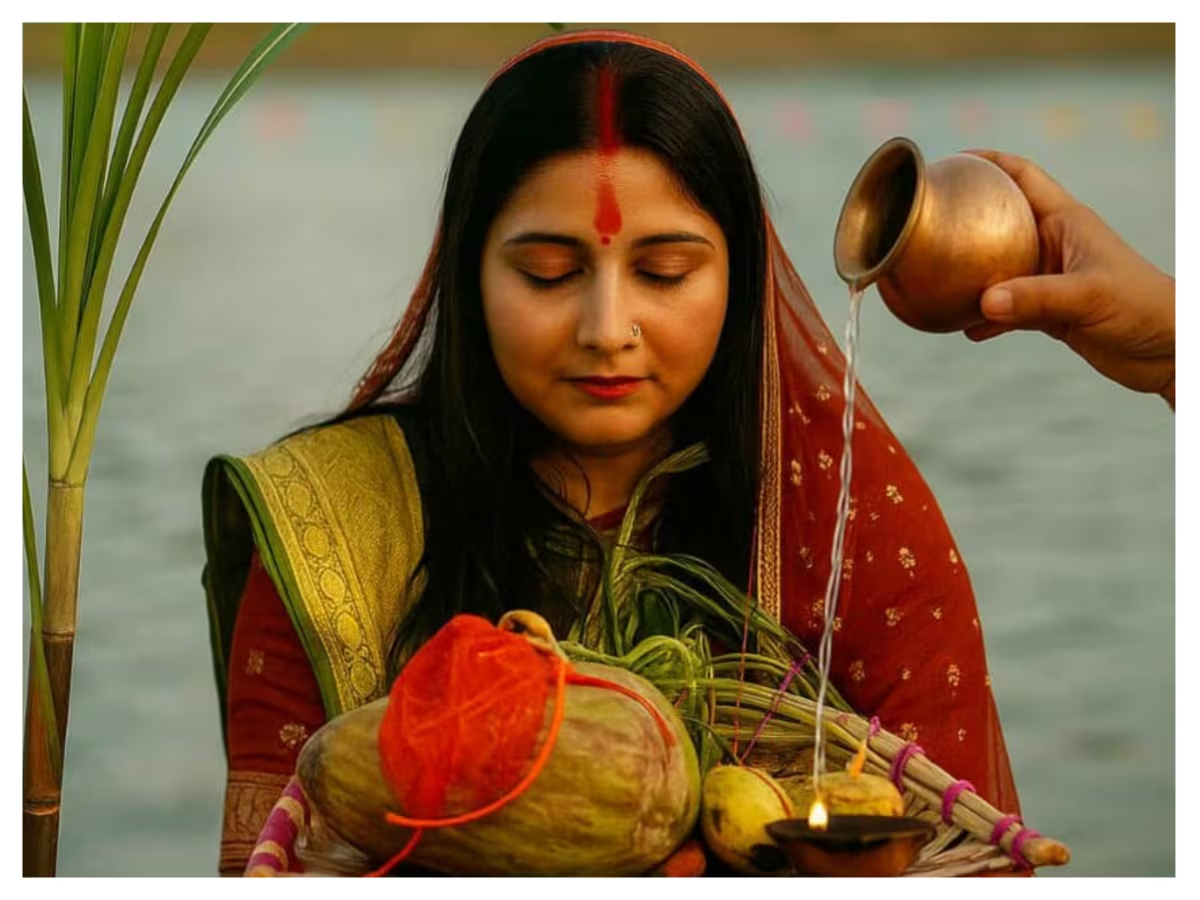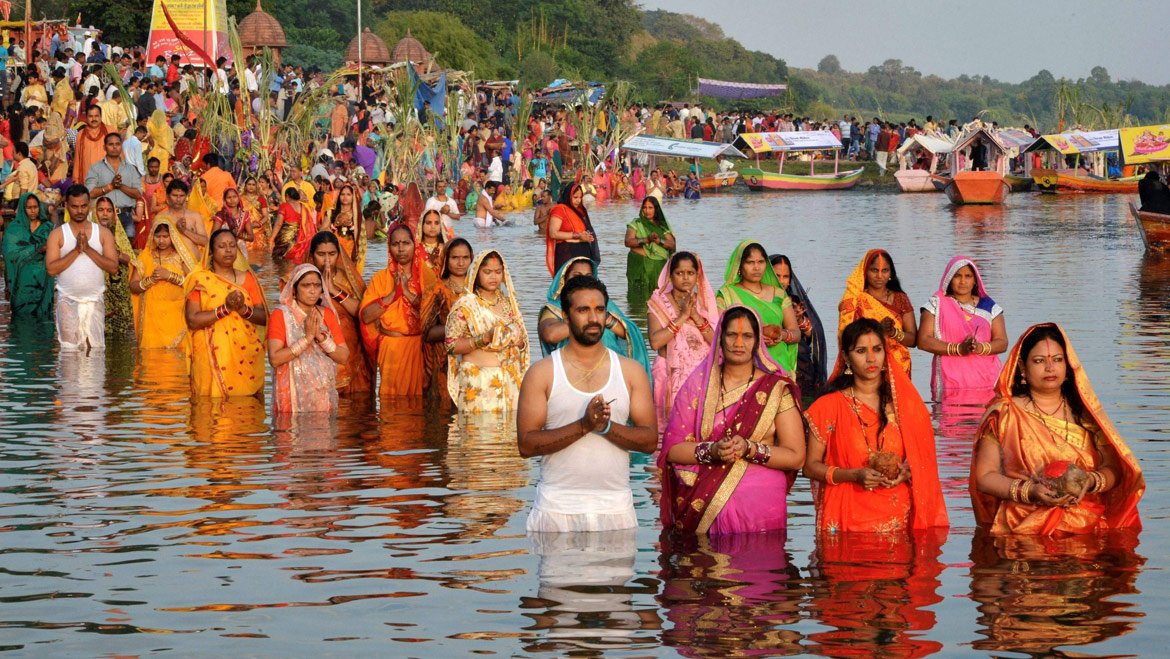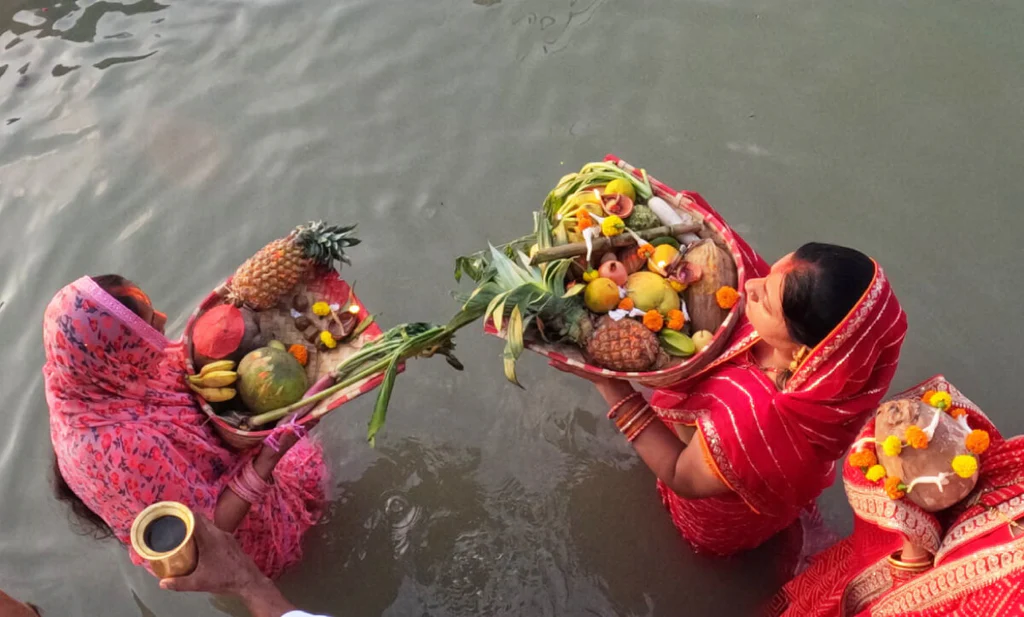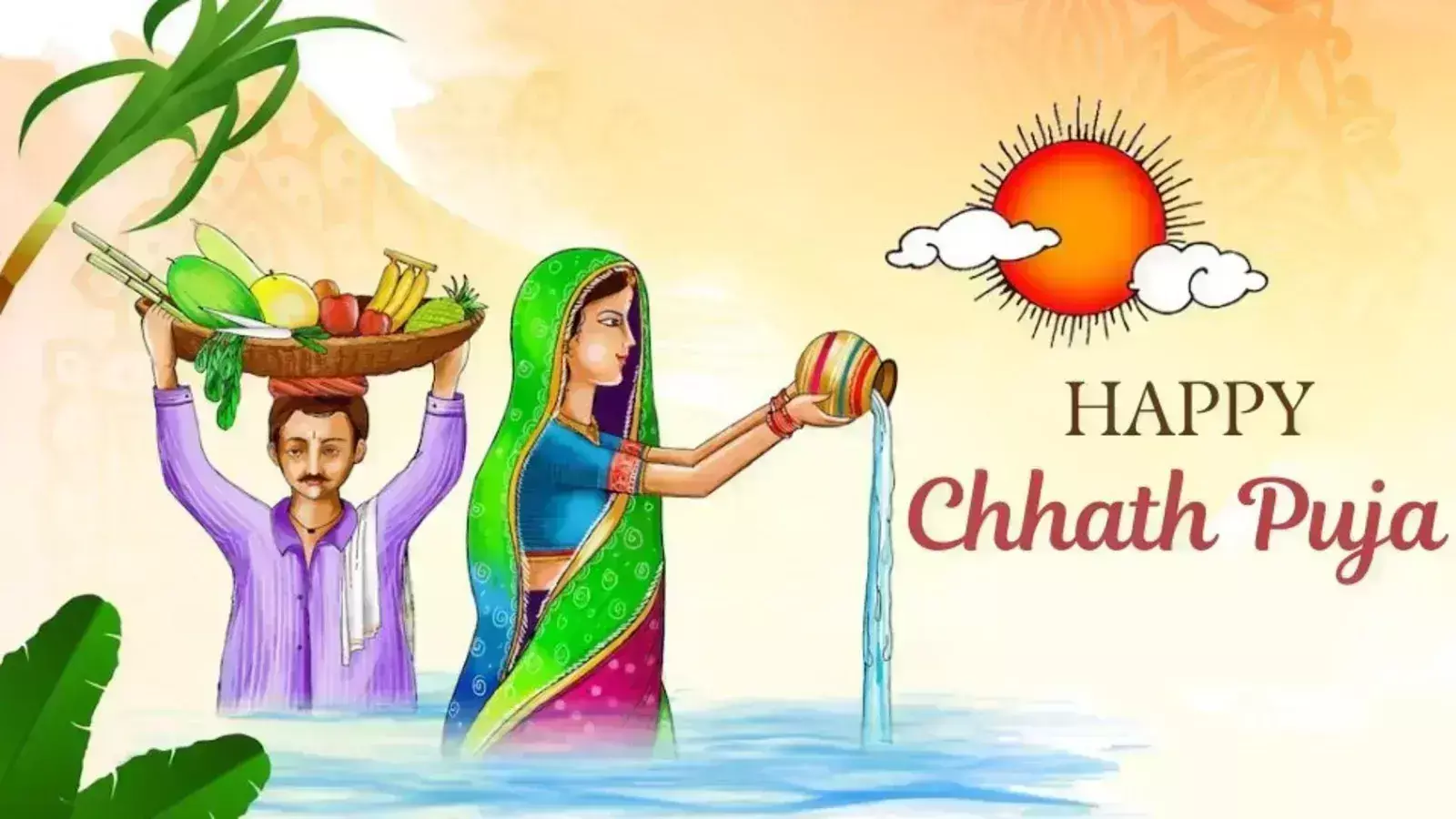Introduction to Chhath Puja
In the river waters, Chhath Puja moving prisms and flecked with the advancing sunlight, men and women kneel, with palms of prayer uplifted, watching their ochre world silently covered with golden twilight. The four-day toil and devotion at the annual Chhath Puja is being shared by the surge of eastern India and Nepal, and miles around this time. It is not a mere festival; it has become a deep personal offering to the Sun God and an invocation of life, purity, and thanks. Even now, somewhere in the wide ocean of urban bustle, the light seems to shine.
Essence and Significance of Chhath Puja
Veneration of Surya — The Radiant Source of Life
In every one of them, basically at the heart of their many deities, sits Surya-worship, or the eternal Sun itself. His rays breathe life into the earth; without him, no seed would sprout; no wind would stir. Chhath Puja Thus, devotees offer their humble prayers and luminous diyas as a mark of respect to this life-giving sun, understood to be the giver of life, acknowledging his never-ending benevolence that feeds every pulse of nature.

The Guardian Grace of Chhathi Maiya
It is the historical conception of the mother who stands next to him-Chhathi Maiya, this maternal deity who is nurturing and protective in her rejuvenative aspects. She stands for well-being in terms of children and strength in families, as well as longevity among loved ones. She can be seen to be really alive in these rituals. A motherly embrace: one that is gentle, nurturing, limitless, really, and that of the universe itself.
The Sanctity of Gratitude and Purity
The three-pronged purity of the body, the mind, and the intention has its roots in Chhath philosophy. It says salty water symbolizes external cleansing, simple food is meant for internal cleansing, and prayers offered with pure concentration keep both the inside and outside clean. On the one hand, the festival teaches you to still your breath in reverence to all those forces that sustain life, while, on the other hand, the present era keeps luring us away from gratitude.
Historical Footprints and Mythic Ties
Ancient Roots and Vedic Reverence
Solar-worship practices have been recorded for centuries and even millennia, as those sung in the Vedic hymns such as the hymns of the Rigveda, which praised the cosmic order and divine harmony of nature. Chhath Puja carries that continuum of antiquity, signifying the eternal dialectic humankind has with the universe and its elemental powers.
Draupadi and the Pandavas’ Devotion
They say that the Five Pandavas offered their worship of the Lord for victory and performed sun-centered rituals like Chhath during their exile. Legends talk of Draupadi doing the same. It is during the time of their exile that it became a fond memory, reminding one of how devotion can lead to strength in times of difficulties, which in itself became the immortal testimony.
Sita and Rama’s Return to Grace
Thereafter, it is said that Sita and Lord Rama performed the Chhath Puja after their sojourn to express their gratitude to Surya and Chhathi Maiya for victory and homecoming. This legendary arrangement makes the festival very much a mute manifestation of Indian mythology and virtue.
Celebration Across Time and Land
Dates of Chhath Puja 2025
In 2025, the sacred sequence unfolds between October 25 and October 28:
- Day 1: Nahay Khay – October 25
- Day 2: Kharna – October 26
- Day 3: Sandhya Arghya – October 27
- Day 4: Usha Arghya and Parana – October 28
Regions of Reverence
Most resonance pulse of Chhath has been strongly felt in Bihar, Jharkhand, Eastern Uttar Pradesh, and some adjacent portions of Nepal. However, its shrine now crosses oceans and goes to the land where the Indian diaspora flourishes: wherever sunlight shines, the faith spreads.

Chhath Puja Beyond Borders
When the migrants travel to other continents, they set up almost similar ghats around their own rivers, lakes, balconies, and even in other such places. Chhath Puja This is not just a ritual but a remembering, a gentle tie to the ancestral soil resonating home through the hymns and reflections of the waters.
The Four Days of Ritual and Renewal
Day 1 – Nahay Khay (Purification through Bath and Meal)
Ritual purification is a common theme in a pilgrim’s life. Worshipers purify their homes, bathe in auspicious waters, and eat a consecrated meal, generally cooked in bronze or clay pots. The act is believed to purify one’s body and spirit, “cleansing” the human heart in preparation for communion with the Almighty.
Day 2 – Kharna (Fasting and Offering)
The extreme rigor of this fast permits eating only after sunset, and the meal may comprise gur ki kheer (sweet rice pudding), fruits, and chapati. Following this, fasting begins with absolutely no food or water until the next sunrise. It serves as a genuine test of devotion and endurance.
Day 3 – Sandhya Arghya (Evening Offering to the Setting Sun)
The powers that reverberate through dusk find their strength down by the rivers with worshippers lining the banks, casting their offerings-thekuas, fruits, and sugarcane-on the waters. The songs of love, the chants ringing in vibrations through the flickering lights of diyas at the water’s edge, make way for the sun to slowly immerse itself into the confluence of light and reflection, or so only the patience that is devotion seemed to sway.
Day 4 – Usha Arghya (Morning Offering to the Rising Sun)
Just before the break of dawn, devotees come once again to prostrate themselves, offering prayers to the Sun, a symbol of rebirth and rejuvenation. The fasting ends with Parana, a collective sharing of prasad to end the ritual amidst joy, gratitude, and kinship.
Traditions, Offerings, and Cultural Harmony
Sacred Offerings
The offerings are very simple, but symbolically they carry a heavy meaning: that is to say, the kua, jaggery, rice, sugarcanes, coconuts, and fruits are considered the symbols of purity and sweetness of life. The preparation of food is done without onions and garlic to maintain sanctity.
Harmony with Nature
The environmental consciousness of this festival is definitely a hallmark quality. People prefer biodegradable items, keep the areas surrounding water bodies clean, and campaign for river protection. Thus, it is a symbol of an ancient sacred ecological wisdom that understands divinity in every drop of water.
Music, Folk Art, and Community Unity
As a soul resonates the sound of folk songs in Chhath Geet when they are sung devotedly, it recounts the stories of ancestors, expectations from mothers, and blessings of elders, forging communities through music, memory, and religion.
Emerging Themes of Chhath Puja 2025
Eco-Friendly Devotion
With the stronger norms attracting attention after 2025, eco-sensitive worship will bring in the most noise. Clean ghats, organic materials, and rituals turned plastic-free convert faith into an environmental crusade, showing that spirituality and sustainability are trade-offs that can co-exist.
Migration and Modern Mobility
Such special trains, buses, and flights were arranged to carry devotees home. An emotional pilgrimage home represents the movement of millions who return not only in geography but in spirit.
Safety and Public Welfare
The authorities take up security arrangements at the shores of the rivers where people throng with the aid of surveillance, lighting, and medical teams. Otherwise, it was the festival of ancient times; now, it has a mark of contemporary responsibility.
Health and Mindfulness
With prolonged fasts and water immersion, Chhath Puja signals a call for bodily care and awareness. Nutrition before fasts, safe water practices, and thoughtful devotion will keep tradition joined with modern wellness.
Joining Chhath Puja from Anywhere
Home Rituals
Distance from rivers does not mean distance from worship. A small, clean bowl of water, a lit lamp, and sincere thanks-how do they conjure that very sacred energy in your home? Location must be sacrificed for intention.
Virtual and Community Participation
In this way, webinars, online hymns, and photos of the rituals help bind together communities on different continents. These adaptations keep the togetherness in spirit even in digital times.
Introducing Children to the Festival
Thus, for each child, Chhath could mean stories of light, gratitude, and thankfulness: “Thank you, Sun, for food, warmth, and play.” Let them help with making fruit baskets, lighting lamps, and singing folk songs. In this way, faith becomes full of happiness and the deepening of insight.

Conclusion
Chhath Puja is, according to tradition, an important cosmological celebration of endurance and the wisdom of nature. Life is sacred. Gratitude nurtures the spirit, and devotion can harmonize humanity with nature.
It’s 2025, and at the very moment when the sun bows down the horizon and rises again in golden robes, let’s hope that offerings will have meaning, songs will make prayers more meaningful, and every ray will remind us: The sun shines for all, endlessly giving and never asking.
FAQs – Chhath Puja 2025
What does Chhath Puja mean, and why is it celebrated?
It is a four-day ritual dedicated to Surya and Chhathi Maiya in the hope of getting health, shielding, and prosperity through purity and devotion.
When will Chhath be observed in the year 2025?
It will be observed from October 25 to 28, strictly following the traditional four-day chain from Nahay Khay to Usha Arghya.
Who is eligible for Chhath Puja?
Anyone, irrespective of age or location, is free to participate. The only matter is sincerity, purity, and reverence.
What are the new themes for Chhath Puja 2025?
This Year focuses on Eco-Friendliness, Safe Travel, Crowd Management, and Public Health.
How can kids be involved in this festival?
You can encourage them to offer fruits, sing Chhath songs, or do small drawings of the Sun. In play and in participation, they soak in the warmth and meaning of the festival.
Also Read: Top Places to Visit in Uttar Pradesh: Discover India’s Timeless Soul


